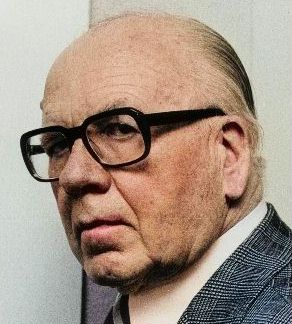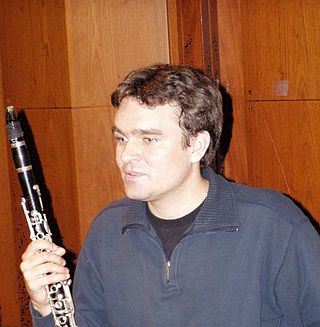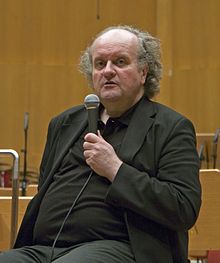
Isang Yun, or Yun I-sang, was a Korean-born composer who made his later career in West Germany.
Nicolaus A. Huber is a German composer.
Johannes Wolfgang Zender was a German conductor and composer. He was the chief conductor of several opera houses, and his compositions, many of them vocal music, have been performed at international festivals.

Wolfgang Fortner was a German composer, academic composition teacher and conductor.
York Höller is a German composer and professor of composition at the Hochschule für Musik Köln.
Karl Julius Marx was a German composer and music teacher.

Georg Friedrich Haas is an Austrian composer. In a 2017 Classic Voice poll of the greatest works of art music since 2000, pieces by Haas received the most votes (49), and his composition in vain (2000) topped the list.
Volker David Kirchner was a German composer and violist. After studies of violin and composition at the Peter Cornelius Conservatory, the Hochschule für Musik Köln and the Hochschule für Musik Detmold, he worked for decades as a violist in the Radio-Sinfonie-Orchester Frankfurt. He was simultaneously the violist in the Kehr Trio founded by his violin teacher Günter Kehr, and a composer of incidental music at the Hessisches Staatstheater Wiesbaden.

Hans-Jürgen von Bose is a German composer.
Siegfried Palm was a German cellist who is known worldwide for his interpretations of contemporary music. Many 20th-century composers like Kagel, Ligeti, Xenakis, Penderecki and Zimmermann wrote music for him. He was also Rektor of the Hochschule für Musik Köln and Intendant of the Deutsche Oper Berlin.
Gerd Domhardt was a German composer.

Jörg Widmann is a German composer, conductor and clarinetist. In 2023, Widmann was the third most performed living contemporary composer in the world. Formerly a clarinet and composition professor at the University of Music Freiburg, he is composition professor at the Barenboim–Said Akademie. His most important compositions are the opera Babylon, an oratorio Arche, Viola Concerto, Kantate and the concert overture Con brio. Widmann has written musical tributes to Classical and Romantic composers. He was awarded the Bavarian Maximilian Order for Science and Art in 2018 and the Bach Prize of the Free and Hanseatic City of Hamburg in 2023. He was Gewandhaus Composer in Leipzig and became Composer in Residence for the Berlin Philharmonic.

Hermann Zilcher was a German composer, pianist, conductor, and music teacher. His compositional oeuvre includes orchestral and choral works, two operas, chamber music and songs, études, piano works, and numerous works for accordion.
Hermann Reutter was a German composer and pianist who worked as an academic teacher, university administrator, recitalist, and accompanist. He composed several operas, orchestral works, and chamber music, and especially many lieder, setting poems by authors writing in German, Russian, Spanish, Icelandic, English, and ancient Egyptian and Greek, among others.
The Beethoven Prize of the city of Bonn was an international composition competition. In 1959 Bonn's Lord Mayor Wilhelm Daniels announced the establishment of a Beethoven prize for "the best orchestral work of a young composer". No restrictions were made to genre, style and instrumentation of the composition. The prize was given every 3 years, the prize money was 25,000DM. The prize was last awarded in 1992. Other Beethoven Prizes existed in Vienna and Berlin.
Konstantía Gourzí is a Greek composer and conductor. She is professor of ensemble conducting and new music at the University of Music and Performing Arts Munich.
Diether de la Motte was a German musician, composer, music theorist, music critic and academic teacher.

Friedrich Schenker was a German avant-garde composer and trombone player.
Michael Svoboda is an American composer and trombonist who lives and works in Switzerland.







